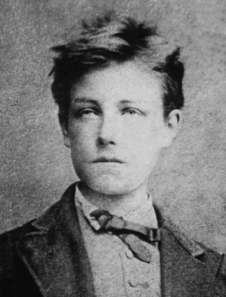Rimbaud
| Arthur Rimbaud | |
|---|---|

Rimbaud, aged 17, by Étienne Carjat, probably taken in December 1871.
|
|
| Born | Jean Nicolas Arthur Rimbaud 20 October 1854 Charleville, Ardennes, France |
| Died | 10 November 1891 (aged 37) Marseille, France |
| Resting place | Charleville-Mezieres Cimetière, Charleville-Mezieres, France |
| Occupation | Poet |
| Nationality | French |
| Period | 1870–75 (major creative period) |
| Literary movement | Symbolism |
|
|
|
| Signature | |
Jean Nicolas Arthur Rimbaud (/ræmˈboʊ/ or /ˈræmboʊ/; French: [aʁtyʁ ʁɛ̃bo]; 20 October 1854 – 10 November 1891) was a French poet who is known for his influence on modern literature and arts, which prefigured surrealism. Born in Charleville-Mézières, he started writing at a very young age and was a prodigious student, but abandoned his formal education in his teenage years to run away from home amidst the Franco-Prussian War. After running away, during his late adolescence and early adulthood, he began the bulk of his literary output, but completely stopped writing at the age of 21, after assembling one of his major works, Illuminations.
Rimbaud was known to have been a libertine and for being a restless soul, having engaged in an at times violent romantic relationship with fellow poet Paul Verlaine, which lasted nearly two years. After the end of his literary career, he traveled extensively on three continents as a merchant before his death from cancer just after his thirty-seventh birthday. As a poet, Rimbaud is well known for his contributions to Symbolism and, among other works, A Season in Hell, which was a significant precursor to modernist literature.
...
Wikipedia
